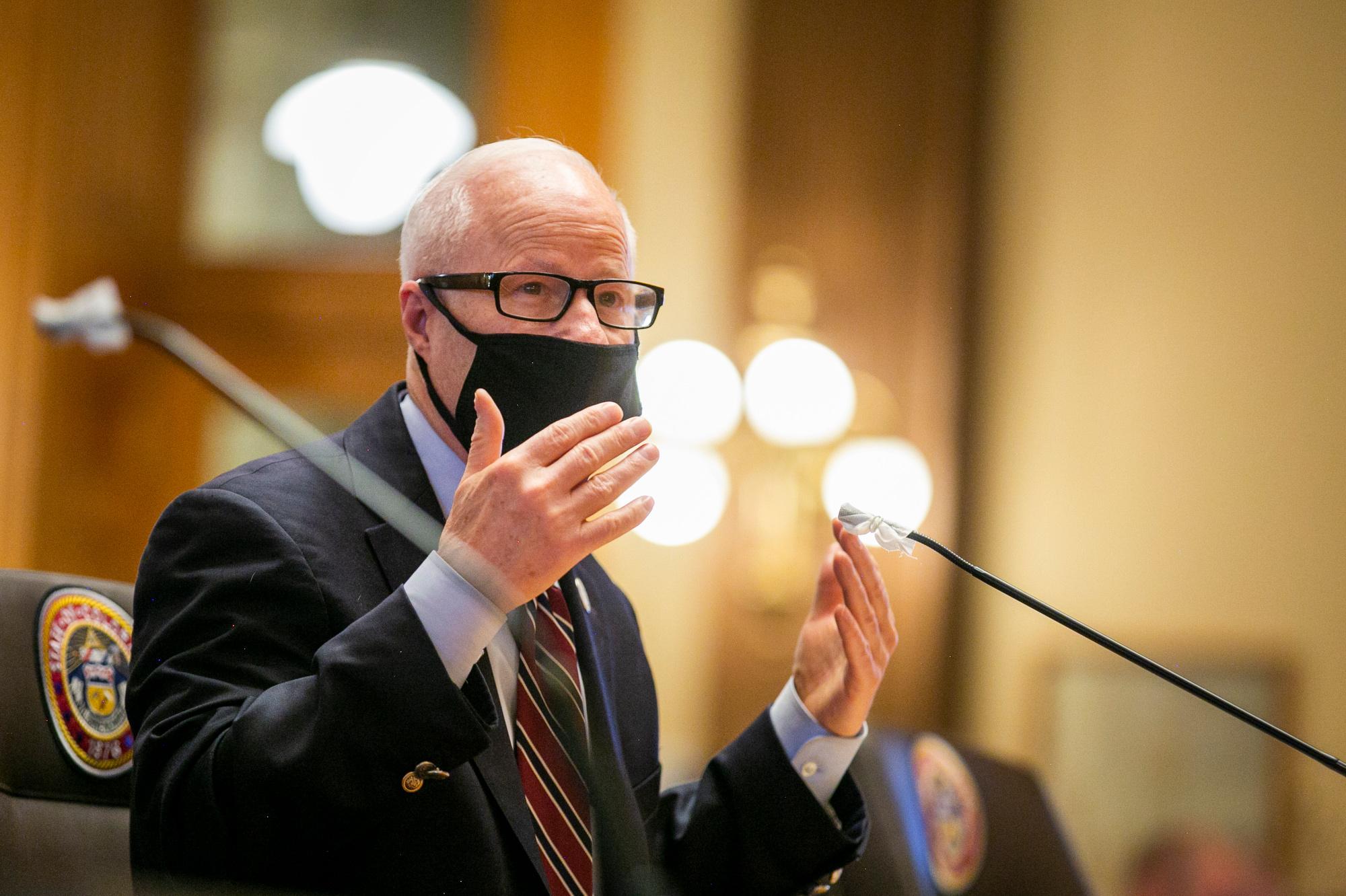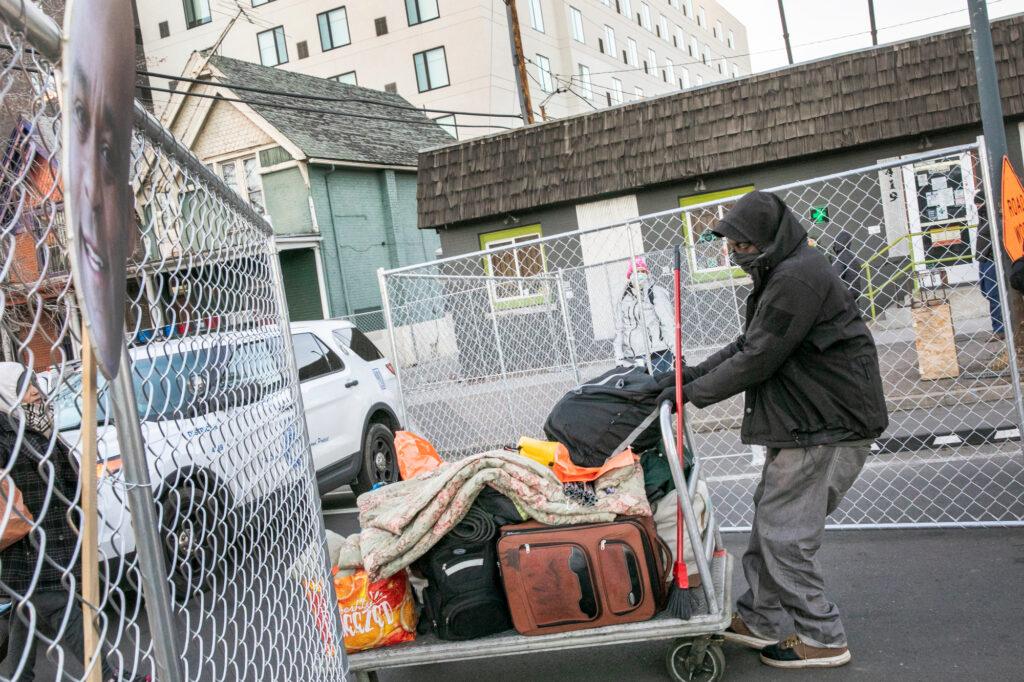
Aurora Mayor Mike Coffman is pushing ahead with his proposed camping ban, despite criticism from Aurora City Council members and housing and homelessness advocates.
Coffman posted the new ordinance to Twitter and Facebook Thursday morning, but he said he won’t present it to the city council committee on Housing, Redevelopment and Neighborhood Services until June.
Aurora has already been working on addressing homelessness. A few years ago, it designated part of its marijuana tax credit for homeless programs, joined a regional coalition and hosted an open-house event about housing alternatives for community members on Wednesday.
“It just seemed very premature to put this out before all those things are happening and like another political stunt than actually wanting to bring forward good policy,” Nicole Johnston, Aurora city council member Ward II, and chair of the Housing, Redevelopment and Neighborhood Services committee.
There were 427 people experiencing homelessness in 2020 according to the last Point in Time Count conducted in the city, but experts estimate counts could be off by 20 percent or more. Aurora has 150 emergency shelter beds, with an additional 100 beds as in the winter, according to Jessica Prosser, director of Housing and Community Services for the city.
Coffman’s ordinance says people living in encampments can’t be forced out unless there are housing alternatives, but homelessness advocates and experts question why the ban has come before housing solutions.
“I think it would be wonderful if we had places for people to go. I think that our unhoused neighbors would love to have a place to go, but I think that it's a fairly ignorant comment and a fairly ignorant way to pass laws in our city,” said Kathleen Van Voorhis, director of housing justice for the Colorado Interfaith Alliance. “We do not have the shelter beds. We do not have the resources.”
Opponents say a camping ban comes after the pandemic worsened the housing crisis, and would turn back progress made toward police reform.
The city already cleans up encampments. From July 2020 until now, city crews or contractors have cleaned up 29 encampments. Additionally, the Colorado Department of Transportation has done the same to the encampments along the Interstate 225 corridor about six times in the last year, Prosser said.
Police currently aren’t involved in the clean-ups, but that could change with the new ordinance.
“I've been involved in a lot of police reform and improving our community relations with the Aurora Police Department and our community, including our unhoused neighbors,” said council member Johnston. “This takes us back with all of the great progress that we're making with the Aurora Police Department and our community. And it puts them in a position of arresting and more of a combative role that we've really, really tried to change.”
Johnston, Van Voorhis and others say the biggest issue with the new ordinance is the order in which it tries to tackle homlessness. Putting a ban before a comprehensive housing-first initiative will be detrimental to unhoused people and copy the mistakes of cities like Denver, they say.
“Before COVID hit, we already had a housing crisis. We already had lots of people out on the street, but within four to five months, the percentage of homelessness on the street increased by 40 percent,” said Benjamin Dunning, an organizer and co-founder of Denver Homeless Out Loud. “The solution to homelessness is housing. If we don't build it, it's going to get worse. If we don't allow access to folks who can't afford housing on the market, we're going to have more people on the streets. It's that simple.”
Coffman is confident Aurora will get funding through the federal American Rescue Plan, some of which will go to infrastructure to address homelessness.
“In other words, building a shelter, the infrastructure for safe camping spaces, or tiny homes or pallet homes,” he said.

Some point to Denver's contentious camping ban as a cautionary tale.
Denver instituted its camping ban nearly a decade ago, and it’s been highly contentious and heavily litigated. Dunning says he remembers the city of Denver made the same promises about housing alternatives back then, when he himself was living on the streets.
“It didn't do any of them,” he said. That’s when he helped found Homeless Out Loud and they put out their first report. They asked the homeless community what they were experiencing and what they recommended be changed.
“Repeal or modify the ban to designate a safe, well-lit, outdoor space in Denver, where homeless people can sleep, shelter themselves and have access to bathrooms and water,” he said. “That was 10 years ago, that was before COVID. We need about 50 of these places right now. And Denver has only managed to find a way to approve two.”
Aurora Council Member Juan Marcano also pointed to Denver as an example of why Aurora should avoid instituting a camping ban.
“If the data from Denver showed that all people needed was a swift kick in the butt then that's something that we would be pursuing, but that is not what the evidence shows,” Marcano said.
Since the ban in Denver was introduced, the homeless population has continued to grow and become more visible.
“And it has become even more difficult to serve because they have only undermined trust from that community by constantly throwing away their belongings, incarcerating them for short periods of time and just moving them around to no end,” he said.
Coffman says he also wants to create housing alternatives, but also says he's concerned about trash and unsanitary conditions.
Coffman said he agrees that housing alternatives need to come first, but he also said that allowing homeless people to stay in encampments endangers public health.
“It’s important to clean those areas up from time to time,” he said. “We just can't have camping spread throughout our city on an annual basis.”
He wants to see Aurora create designated areas and a variety of alternatives for people who may not feel comfortable or want to go to shelters or stay in encampments. But, the trash and debris, Coffman said, are an issue for residents.
In the last year, the city has received about 900 complaints from residents about homeless issues, half of those were RV complaints.
“I get a lot of complaints about the trash, about the unsanitary conditions, the visual blight,” Coffman said.
Another city council member, Dave Gruber, said he also gets complaints from residents about homeless people and encampments in the city. He agrees housing needs to be addressed before moving people around the city, but he thinks Coffman’s ordinance makes that need a priority.
“Something has to be done. The status quo is not working. We've heard over the last few years, if we do this the problems will go away, but we still have the problem,” he said. “Even with the millions that we're investing right now. So I see this as a next step, but implementing it in such a way to ensure that there is shelter for people to go to.”
Editor's note: This story has been corrected. An earlier version used an incorrect name for the American Rescue Plan.








